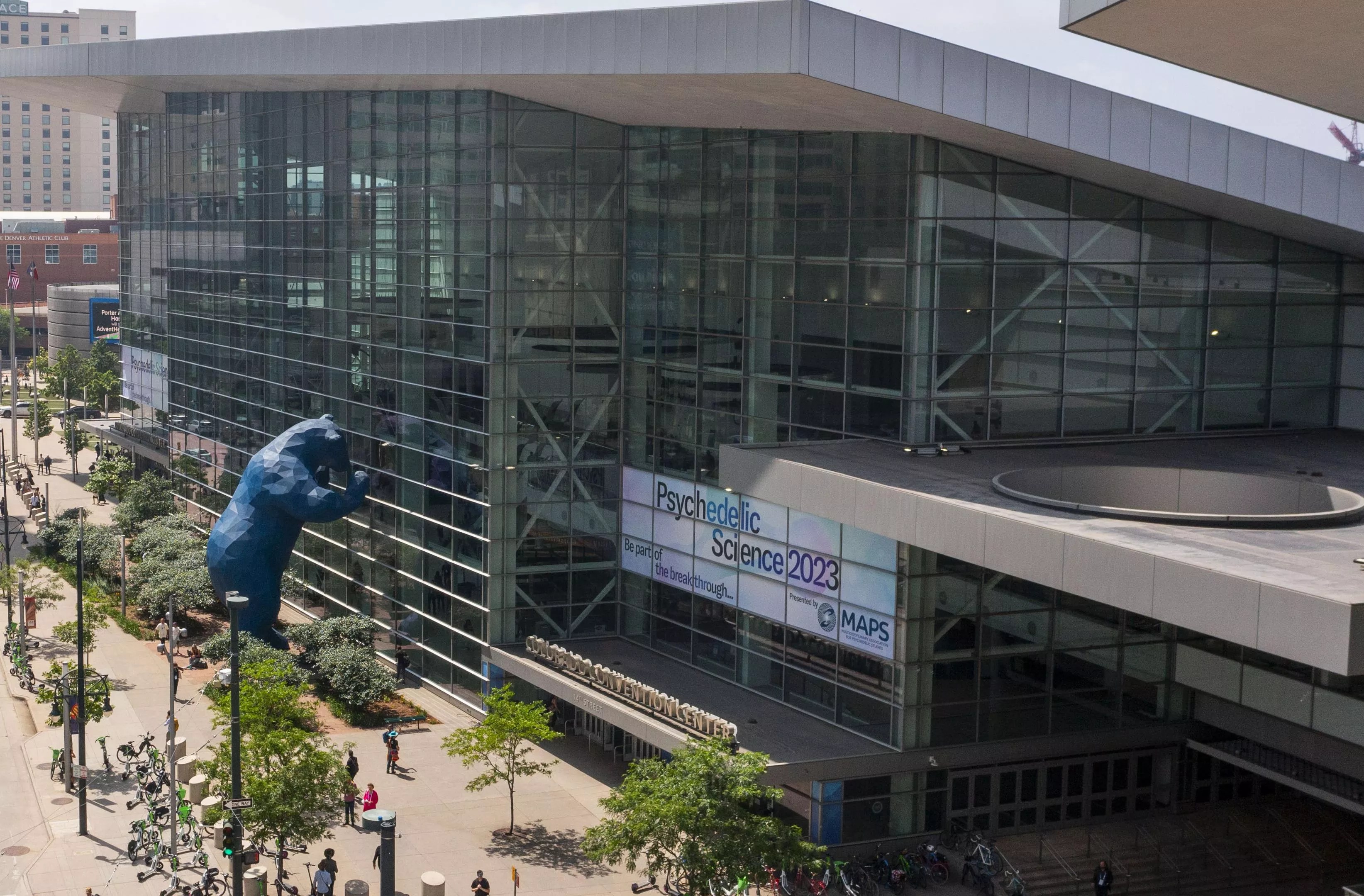
Psychedelic Science 2023

Audio By Carbonatix
Denver’s role as a capital of the psychedelics field will continue to grow over the next two years, as major industry gatherings return to the Colorado Convention Center.
The Multidisciplinary Association for Psychedelic Studies (MAPS) will be back in Denver in 2025 to host Psychedelic Science, a five-day expo scheduled for June 16-20. This will be the third time in a row that MAPS has held the biennial conference in the Mile High City.
The 2023 MAPS convention drew an estimated 12,000 attendees and featured such keynote speakers as Aaron Rodgers, Jaden Smith, Governor Jared Polis and former Texas governor Rick Perry, as well as a long list of leading researchers and authors, including Michael Pollan and Paul Stamets. The organization described it as the “biggest psychedelics conference in history by a landslide,” so MAPS has a lot to live up to in 2025.
“If we could make it just as successful and smooth and get the same feedback as last time, we’d be happy, but we’re looking to make it bigger and better in 2025,” MAPS communications officer Kevin Cranford says. “It was successful last time, so we’re not as scared going at it this time.”
MAPS and Denver were both on the ground floor of a growing movement toward psychedelic decriminalization and medical legalization. Denver was the first city in the country to decriminalize the possession of small amounts of psilocybin mushrooms in 2019, while Colorado became the first state to decriminalize a handful of natural psychedelics and the second state (behind Oregon) to legalize medical psilocybin in 2022. MAPS was founded in 1986 and has slowly grown into the largest psychedelics advocacy group in the country, leading federal research trials with MDMA.
Colorado is still crafting regulations to create the state’s new framework for medical psilocybin and laws surrounding DMT, ibogaine, mescaline and psilocybin, which are all currently decriminalized in Colorado. Much of the work falls on elected officials and an advisory board with the state Department of Regulatory Agencies, while the City of Denver and Colorado’s new Natural Medicine Division, an arm of the Department of Revenue, are also holding rulemaking discussions for upcoming psilocybin regulations.
As the state continues to craft laws and rules, entrepreneurs and psychedelics professionals have flocked to Colorado over the last two years to launch businesses, conduct research or practice forms of healing and ceremonial use, especially those working with psilocybin.
“We know those professionals and hope to bring them into these conferences to talk to other legislative bodies around the country, and share their information to see what works best. That’s what this conference is all about: the melding of minds and sharing best practices,” Cranford says.
In connection with the 2023 Psychedelic Science expo at the Convention Center, over eighty ancillary events for psychedelics enthusiasts were held in Denver that week, according to Cranford, including magazine launches, celebrity appearances and a MAPS fundraiser show with Eric Andre and Reggie Watts. He expects more of the same next year, as well as more intimate sessions at the conference and a wider range of psychedelics to be discussed.
“We’ve heard that some people like the big-ness of it, but they also wanted some more intimate discussions and person-to-person experiences, so we’ll be providing that,” he says, noting that MAPS is still combing through attendee questionnaires to find areas that can be improved. According to Cranford, the organization will be moving into ibogaine research, as well.
Ibogaine is an extract from root bark on the iboga shrub that has traditionally been used by African cultures for healing, religious and spiritual use. It shows considerable potential in treating traumatic brain injuries among military veterans, according to recently published research from Stanford University, and is often used to fight opioid addiction. Colorado lawmakers fast-tracked ibogaine for medical consideration last year, requiring DORA to review the substance for a similar status to psilocybin, but ibogaine has also shown cardiac risks, so legislators outlawed the sharing of ibogaine (but not cultivation or possession) last year, too.
Cranford says MAPS is still building an agenda, schedule and list of speakers for next year’s convention; in the meantime, the group maintains an active presence in Colorado through rulemaking and local partnerships. The organization recently submitted a psychedelic emergency training and guidance program for first responders working for the City of Denver in a budding partnership that could be finalized within the next couple of months.
“We’ve been working with the city on some videos and modules in assisting with psychedelic instances,” Cranford says. “They’ve been accepted by the city, but we’re still waiting on a couple of more signatures to be signed.”
PsyCon, a smaller psychedelic industry conference that took place at the Colorado Convention Center shortly after Psychedelic Science, announced this week that it’s returning to downtown Denver, too, from October 10 to October 12 this year. Unlike Psychedelic Science, PsyCon takes its show on the road to different cities around the country throughout the year, while also catering to local psychedelic industries and enthusiasts, according to organizers.